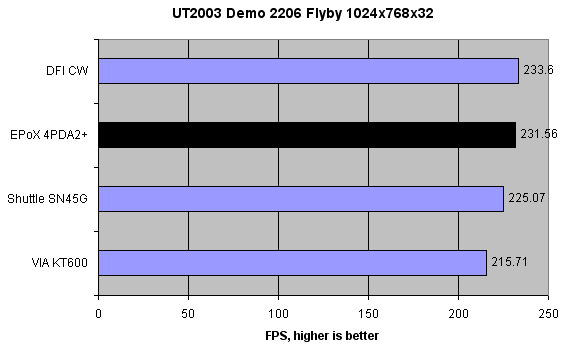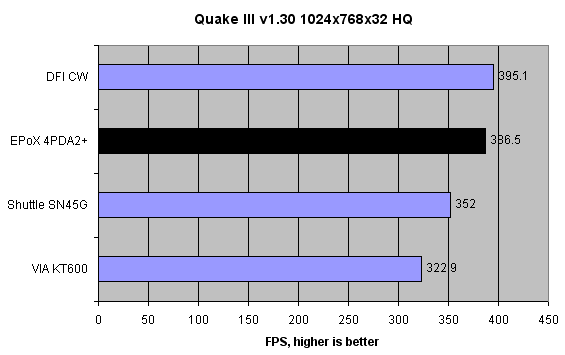Benchmarks III and thoughts
UT2003 Demo's Flybys now. At 1024x768x32.
And the vintage Quake III v1.30.

Thoughts
It finished just as it started off, that is, a little off the pace of a decent Canterwood board. We've liked this board right from the outset. The features count is eminently sensible, with due thought being paid to both IDE and SATA RAID capabilities. Layout is good for such a busy board and it feels well-constructed. Packaging and presentation are also good. The bundle generally provides what you'll need to get it up and going with the minimum of fuss. If we're being critical, an extra USB2.0 cable S/PDIF cable would have complemented the feature set that little bit better.
Performance was pretty good with the most aggressive timings set in BIOS. Our benchmark graphs will undoubtedly show that it trailed the comparative DFI Canterwood in almost every benchmark, but have a look at the performance deviation between the two. Can one really tell the difference between, say, 395 and 386FPS ?. That's almost the trouble with the Canterwood - it simply doesn't pull out enough of a lead to warrant purchasing over and above a well-tuned Springdale.
This 4PDA2+ sample was a prodigious FSB overclocker, a features champion and a paradigm of stability. As long as EPoX launch a BIOS that corrects the Vcore failings found on the 6/18 update, we're confident that this board will sell well. One has to ask themselves exactly what they need from a prospective motherboard. This EPoX seems to have most of the bases covered.
Pricing is tentative at the moment. We'd expect it to hover around £120. A well-rounded Springdale board from EPoX. Recommended.
Highs
-
Decent presentation and a good bundle
-
A sensible array of premium features
-
Super stability
-
Excellent overclocking potential
Lows
-
Doesn't appear to have exemplary PAT-like BIOS found on some competing boards (ASUS P4P800 and ABIT IS7). EPoX maintain that it does, and that falls under the name of AMM (Aggressive Memory Mode)
-
Vcore limitation may put some users off. This could be resolved with something as simple as a BIOS release.














